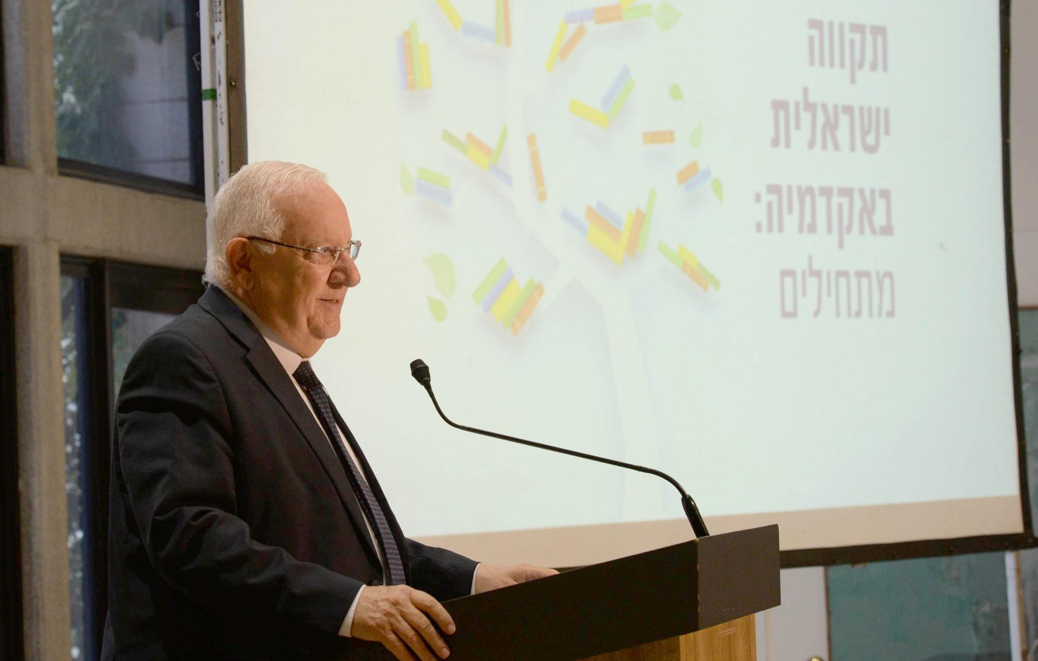President Reuven Rivlin had a vision – to unite all Israelis in all sectors of the country. In 2015, the year following his inauguration, he created Israeli Hope, a venture that seeks to strengthen the “togetherness” of Israeli society through giving respect to, and a place for, every group that comprises it, in order to ensure the strength and prosperity of the State of Israel.
Israeli Hope: Creating Partnerships
Israeli Hope aims to establish partnerships between the four main sectors that comprise Israeli society: secular, religious, ultra-Orthodox, and Arab. The project operates in key social and economic fields – in education, academia, employment, sport, and more.
Israeli Hope in Academia
According to President Rivlin, academia and the job market are the gateways to the realization of the Israeli dream. “They are the entrance ticket for us all to the centers of influence in the economy, the place where a shared space for the creation of shared language and goals is initially created.
“There the sense of belonging and social status are shaped, there the ideological richness of human diversity is not a threat – it is a competitive advantage,” he said.
The Israeli Hope in Academia program was launched in July 2016 and operates in all universities and public colleges.

The President of the State of Israel, Reuven (Ruvi) Rivlin (above), and the Chair of the
Council for Higher Education’s Planning and Budgeting Committee, Prof. Yaffa Zilbershats
(former BIU Deputy Vice President, below), launched Israeli Hope in Academia together with
the 62 presidents of the recognized academic institutions in Israel in July 2016.
Israeli Hope at Bar-Ilan University
“Bar-Ilan University considers itself a significant meeting place between different groups in Israeli society, and considers faculty members a central link to the success of the university project,” said Dr. Liat Friedgott Netzer, who heads up the Bar-Ilan University chapter of the program.
“The university has participated in “Israeli Hope for Academia” in a variety of ways over the past few years. These include seminars, webinars, tours, and special events, with initiatives that have also sparked new degree courses at the university.”
Projects in which Bar-Ilan University is involved include:
Cultural Meetings
Assisting faculty with research, teaching, and servicing diverse populations. In this framework, we hold knowledge sessions, lectures, applicable workshops, and tours aimed at opening the door to diverse cultural worlds in Israeli society, as well as giving applicable tools to deal with the “other”.
The training program was adapted for each department according to its needs and challenges. So far, dozens of such meetings have been held in the various departments. Those who wish to participate in the program are welcome to contact us. It is possible to hold these sessions by Zoom.
The Institutional Environment as a Meeting Scene
Social and institutional activity that creates meaningful meetings, an academic calendar tailored to the various groups in Israeli society, a website, and more.
Curriculums
Educational programs on Israeli society showing its diversity, adapting content and formulations of courses and exams to accommodate a variety of students. As part of this, “Eshkol Multicultural Courses” was launched, which is in its third year, and is directed to all undergraduate students.
Students
Dedicated programs for accessing entry into higher education for diverse groups, recruiting students from diverse groups, and supporting these groups. A special program was launched to support ultra-Orthodox students. Additional activities such as “Hebrew-Arabic: One-on-One” and the construction of “Circles of Agreements” to help students when confronted by controversial topics are planned for the coming year
Evaluation and Measurement
Evaluating the student experience and the experience of employees in the institution (sense of belonging, community, collaboration). In this framework, we invite researchers to conduct studies related to diversity in academia/employment/changing attitudes. Research can be conducted in conjunction with our intervention programs.
Israeli Hope Award
In addition to the many projects running at Bar-Ilan University, launched the “Israeli Hope Award”, a special prize in the spirit of “Israeli hope” for the wonderful initiatives coming out of the university. We received 34 nominations from students, administrative and academic staff.

Israeli Hope Awards Ceremony at Bar-Ilan University
The people and initiatives that have received awards are:
- Avi Gilboa, Music Department, for musical dialogue between Arabs and Jews, and musical therapy for Haredi women;
- Zehavit Gross, Education Department, for interfaith meetings between Arab and Jewish students dealing with religious texts and entertaining religious leaders;
- Shai Gol, PhD Student, Math Department, for teaching basic skills (English, Math, Hebrew) to Arab cleaners;
- Haredi student representative who organized special activities suitable for Haredi students;
- Revital Hemi Zaimal, Conflict Resolution Department, conflict mediation program;
- Lilah Netanel, Hebrew Literature Department, a special course for literacy skills for students whose first language is not Hebrew; and
- Ben Molov, Communications Department, Jewish-Arab Inter-religious Dialogue Course (the course grew out of an exciting student initiative and the students were co-winners of the prize). Dr. Molov also received his award for a Master’s Intercultural Training course entitled: “New Approaches to Conflict Resolution in Israeli Society” under the Conflict Resolution, Management and Negotiation (CRMN) Graduate Program (in partnership with the Konrad Adenauer Foundation). The course’s highlight is an annual interreligious, intercultural, interactive seminar in Akko.

President Reuven Rivlin (seated center) attended the “Israel Hope Awards” at Bar-Ilan University.
Seated next to him is Prof. Arie Zaban, President of Bar-Ilan, with faculty and staff of the university
Any Bar-Ilan University student and/or faculty member who is interested in participating in any of the existing programs, or has “Israeli Hope” projects they’d like to initiate, is welcome to do so.
If you need any further information on Bar-Ilan University’s involvement in the Israeli Hope Project, please email Dr. Liat Friedgott Netzer.
Find out more about the Israeli Hope Project here.
Contact Us for More Info
Leave your details and we’ll get back to you soon


